|
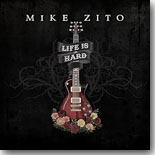 Mike
Zito endured the passing of his wife, Laura,
from cancer last year. The couple had planned
Zito’s new album, Life Is Hard (Gulf
Coast Records) to serve as a catharsis for the
singer/guitarist after her passing, a way to
pour his heart and emotions out via his music.
Enlisting Joe Bonamassa and Josh Smith as
producers (who also both play guitar on the
album), and featuring Reese Wynans on keyboards,
Calvin Turner on bass, and Lemar Carter on
drums, Zito has arguably crafted the best album
of his career. Mike
Zito endured the passing of his wife, Laura,
from cancer last year. The couple had planned
Zito’s new album, Life Is Hard (Gulf
Coast Records) to serve as a catharsis for the
singer/guitarist after her passing, a way to
pour his heart and emotions out via his music.
Enlisting Joe Bonamassa and Josh Smith as
producers (who also both play guitar on the
album), and featuring Reese Wynans on keyboards,
Calvin Turner on bass, and Lemar Carter on
drums, Zito has arguably crafted the best album
of his career.
The 12-song set includes nine covers,
several associated with other genres, and
two Zito originals. He pours every fiber of
his being into these songs, as do Bonamassa,
Smith, and the other musicians. For
listeners familiar with Zito’s backstory,
it’s hard to hear these songs and
performances and not be moved.
A rousing take of Little Milton’s “Lonely
Man” gets the disc started off in high gear,
with Wynans tearing it up on the keys,
Paulie Cerra on sax, and Zito turning in a
powerful vocal and guitar performance. The
title track, written by Fred James, is next,
and I’m sure it’s a song Zito has referred
to many times over the last year. Certainly
seems like it, based on his impassioned
delivery here.
The terrific cover of Stevie Wonder’s “Have
A Talk With God,” is a nice surprising
inclusion, a soulful, funky breath of
reassurance through the pain. Zito’s first
original of the album, “Forever My Love,” is
an incredible slow blues that finds Zito’s
grief over his loss spilling out over every
note and word (a radio edit of this song
closes the album).
The raucous rocker “No One To Talk To (But
The Blues)” was originally recorded by Lefty
Frizell, with Zito’s version playing pretty
closely to the original but with a bit more
of a rock edge.
Zito does a fine job on Tinsley Ellis’
ominous “Dying To Do Wrong,” before turning
in another interesting cover, the Guess
Who’s “These Eyes,” which has a ’70s
soul/R&B feel, complete with French horns
from Jennifer Kumma and Anna Spima, plus
backing vocals from Jade Macrae and
Dannielle Deandrea.
A smoldering take of Tab Benoit’s “Darkness”
follows, with scorching guitar work and
heartfelt vocals from Zito. “Without Loving
You,” another Zito original, is a crisp
blues rocker that finds him pondering where
to go from this point forward.d Walter
Trout’s “Nobody Moves Me Like You Do”
showcases plenty of fierce guitar work,
while the album’s closer is a haunting read
of Rev. Gary Davis’ “Death Don’t Have No
Mercy” that builds in intensity, adding
backing vocals and instrumentation before
ending abruptly.
One of the most moving albums, you’ll hear
this year, Life Is Hard is a superb
effort from Mike Zito, with a little help
from his friends.
--- Graham
Clarke
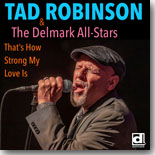 I
was excited to hear that Tad Robinson
had recently re-signed with Delmark Records.
His debut release for the label, One To
Infinity, remains a favorite of mine,
and his tenure with Severn Records was
memorable as well. I
was excited to hear that Tad Robinson
had recently re-signed with Delmark Records.
His debut release for the label, One To
Infinity, remains a favorite of mine,
and his tenure with Severn Records was
memorable as well.
It feels like he’s back home again with a
new album on the way from Delmark and the
release of a new single, recorded at
Evanston SPACE with the Delmark All-Stars
(Sheryl Youngblood – vocals, Dave Specter
and Mike Wheeler – guitars, Roosevelt
Purifoy – B3, Larry Williams – bass, and
Cleo Cole – drums) during Delmark’s 70th
anniversary concert. “That’s How Strong My
Love Is” was originally recorded by soul
legend O.V. Wright in 1964, but has been
covered by numerous other soul, blues, and
rock artists since then.
Robinson carries the tune, and the day, with
a vocal that slowly builds in intensity as
the song progresses, similar to Wright’s
original. Youngblood’s background vocals
complement him well, and the band’s support
is stellar, as to be expected. This should
hold fans until the release of Robinson’s
Delmark full-lengther.
--- Graham
Clarke
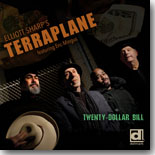 Elliott
Sharp is mostly known for his forays into
experimental/avant garde jazz music, having
released over 80 albums covering a bevy of
musical styles. The multi-instrumentalist
has also led his band Elliott Sharp's
Terraplane since the early ’90s,
which combines country and urban blues,
occasionally adding other genres to the mix
as the band has progressed. Elliott
Sharp is mostly known for his forays into
experimental/avant garde jazz music, having
released over 80 albums covering a bevy of
musical styles. The multi-instrumentalist
has also led his band Elliott Sharp's
Terraplane since the early ’90s,
which combines country and urban blues,
occasionally adding other genres to the mix
as the band has progressed.
The group recently signed a deal with
Delmark Records, with an album in the works
for August release, recently releasing their
first single, “Twenty Dollar Bill,” which
features Eric Mingus (son of Charles Mingus)
on vocals. The song is a rumbling, electric
blues with a bit of a Mississippi Hill
Country drone, as Mingus laments the value
(or lack thereof) of the dollar for all of
us these days. Sharp’s guitar pierces
through the steamy haze and humidity of the
driving rhythms generated by Dave Hofstra
(bass) and Don McKenzie (drums).
--- Graham
Clarke
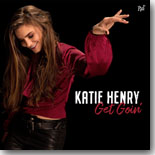 Get
Goin', the second album on Ruf Records
for Katie Henry, is showing the
maturity and development of one of the
brighter young artists on the blues scene.
Produced by Bernard Allison, this latest
album is a few steps further into the blues
than On My Way, her Ruf debut in
2021, which was a more of a mix of blues,
Americana, and country. The New Jersey
native's music still blends into those other
areas, but now is more clearly delineated as
a blues album, helped by Allison's direction
and his band backing her on these 11 cuts. Get
Goin', the second album on Ruf Records
for Katie Henry, is showing the
maturity and development of one of the
brighter young artists on the blues scene.
Produced by Bernard Allison, this latest
album is a few steps further into the blues
than On My Way, her Ruf debut in
2021, which was a more of a mix of blues,
Americana, and country. The New Jersey
native's music still blends into those other
areas, but now is more clearly delineated as
a blues album, helped by Allison's direction
and his band backing her on these 11 cuts.
Henry is a multi-faceted talent, being a
very capable singer, guitarist, and keyboard
player. But perhaps her best talent is her
songwriting, with the ability to convey her
inner emotions to the listener. There are
likely many "song of the year" nominations
in her future.
Many of her songs revolve around the
recovery from bad choices in men and the
subsequent problems, starting with the
catchy, up-tempo "Love Like Kerosene," a mix
of blues/rock and country, as she sings
about how her mind gets messed up every time
that man comes around. We get to hear
Henry's skill on piano here. Her vocals are
more restrained and a touch sultry on the
snaky blues, "Jump," as she finds herself in
the rubble of a home not built to last. "A
Doll's Heart" opens with a slow, quiet piano
solo before her voice gains strength as she
begins to sing about relationship issues.
The up-tempo blues shuffle, "Clear Vision,"
has Henry singing about putting the past
behind and moving on with her career despite
the doubts of others. She's bolstered by the
fact that her masters have told her, "...
times will be good, sometimes will be bad,
you're gonna make it big some day ...," with
strong piano work accentuating her positive
thoughts. Henry turns in a funkier version
of the oft-covered blues "Voodoo Woman," on
which she takes a subtler approach to the
vocals than on other renditions, coming in
later with a tasteful Wurlitzer piano solo.
One of my favorite cuts is "The Lion's Den,"
an up-tempo night time blues driven by
urgent drumming and Henry's more restrained
vocals, before the volume comes up midway
through the song. Henry sings about walking
out and then back into the lion's den, ready
to face whatever issues she previously had
there.
Even better is the slow soulful blues, "Wake
Up Time," showing her songwriting skills as
she effectively pours the pain from her
heart, asking her partner where they went
wrong and then singing, "... Is this how the
story ends, star-crossed lovers who can't be
friends? ..." She reinforces that pain in
her heart with a guitar solo that brings out
the same emotions. "Wake Up Time" is my
nomination for Song of the Year. "Get Goin'
Get Gone" continues in the same vein, a nice
blues shuffle with a big dose of soul, but
with more of a feeling of relief in her
voice as she says this time she's not the
one who's moving out.
A nice interlude is the Louisiana-based
instrumental, "Bayou Boogie," with both
guitar and piano driving the song along.
Moving back to relationship issues, "Trying"
is a mid-tempo funky blues that has strong
solos from both the Wurlitzer piano and
guitar.
Closing the album is a nice version of Blind
Willie Johnson's traditional blues/gospel
tune, "Nobody's Fault But Mine," as Henry
does some self-reflection and takes blame
for what's gone wrong. A nice, subtle ending
to a very strong album.
Katie Henry demonstrates growth as a
performer and a songwriter with Get Goin'.
She's a rising star on the blues scene, with
many more years ahead.
--- Bill
Mitchell
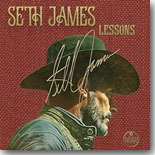 The
longer I listen to music, the more I
appreciate Delbert McClinton’s
contributions. The Texas-born troubadour’s
music takes in a host of genres --- soul,
blues, country, rock, and R&B --- .and no
doubt contributed to the development of the
Americana genre (he’s called “The Founding
Father of Americana,” so, yeah). His music
probably led a lot of fans (like your humble
reviewer) to explore those other genres and
discover a whole lot more great artists and
music, but I still love to listen to some
good ol’ Delbert tunes when I have a chance. The
longer I listen to music, the more I
appreciate Delbert McClinton’s
contributions. The Texas-born troubadour’s
music takes in a host of genres --- soul,
blues, country, rock, and R&B --- .and no
doubt contributed to the development of the
Americana genre (he’s called “The Founding
Father of Americana,” so, yeah). His music
probably led a lot of fans (like your humble
reviewer) to explore those other genres and
discover a whole lot more great artists and
music, but I still love to listen to some
good ol’ Delbert tunes when I have a chance.
Apparently, so does Seth James,
another Texas troubadour, who grew up
listening to McClinton. With the help of
producer, keyboardist, guitarist, and
songwriter Kevin McKendree (who worked with
McClinton for over 25 years), just assembled
a superb collection of his songs, Lessons
(Qualified Records).
James and McKendree, with help from
McClinton’s rhythm section (Lynn Williams –
drums, Steve Mackey – bass), guitartist Rob
McNelley, horn section Vinnie Ciesielski,
John Hinchey and Jim Hoke, and backing
vocalists Nick Jay and Alice Spencer,
deliver 11 tunes from the legend’s catalog,
some familiar and a few less so. James
doesn’t play guitar on this set, instead
focusing on his vocals which bear many
similarities to McClinton’s. Naturally, the
band is as familiar with the catalog as
James, so it’s obvious from beginning to end
that this was a labor of love for all
involved.
The opening tune, after a short
introduction, is a familiar tune, “Honky
Tonkin’ (I Guess I Done Me Some),” which
sums up the McClinton sound as well as any
song could. “Real Good Itch” is a greasy,
good-natured country-flavored blues, and
“Who’s Foolin’ Who” is reworked a bit from
the original’s light tropical feel with
James’ rendition leaning heavier to the
funky R&B side, but the horn-driven “Maybe
Someday Baby” still swings like mad.
One of the less familiar tunes on the album,
“The Rub” is a harrowing tale with a
slippery groove that James narrates as
deftly as McClinton did on Room To
Breathe. “Morgan City Fool” is a track
from McClinton’s earlier days, and James’
version retains the greasy swamp vibe of the
original. The jaunty “Victim of Life’s
Circumstances” is a solid entry here, as
well, a lively country rocker.
“Lesson In The Pain of Love” is another
horn-fueled track, and James’ soulful vocals
are standout, while “Ruby Louise” is another
seldom -heard gem from McClinton’s
underrated ’70s recordings. McKendree’s
stellar piano work is a highlight.
“B Movie Boxcar Blues” is one of McClinton’s
most-recorded songs, and James does the
dynamic tune justice, replacing harmonica
with Hoke’s saxophone. The final tune is the
soulful ballad “Take It Easy,” which
appeared on the same album as “B Movie
Boxcar Blues” and “Maybe Someday Baby”
(1978’s Second Wind), and James turns
in an excellent vocal for this superb
closer.
Lessons is a fine tribute to one of
the music world’s truly legendary singers
and songwriters, with McClinton having
written all of these selections. Seth James
does a marvelous job with these tracks.
Llisteners will not only want to backtrack
to hear the original versions, but they’ll
definitely want to hear more from James as
well.
--- Graham
Clarke
 On
the heels of his award-winning album,
Ridin', from 2023, Eric Bibb has
another strong release in Live At The
Scala Theatre Stockholm (Stony Plain).
With a career now five decades long, the New
York City native grew up around the
Greenwich Village folk scene when his
father, Leon, was active on the scene there
and also in the civil rights movement. On
the heels of his award-winning album,
Ridin', from 2023, Eric Bibb has
another strong release in Live At The
Scala Theatre Stockholm (Stony Plain).
With a career now five decades long, the New
York City native grew up around the
Greenwich Village folk scene when his
father, Leon, was active on the scene there
and also in the civil rights movement.
Just hearing Bibb with no other
accompaniment would be fine, but for this
live show in Sweden he added a host of other
musicians, both from the states as well as
local players. This expanded group adds a
richness and diversity to the 10 songs done
in front of audience. The sound quality is
pristine and the crowd noise unobtrusive.
Opening the show is a beautiful version of
the traditional blues, "Goin' Down The Road
Feelin' Bad," augmented by pedal steel
guitar from Johan Lindström and fiddle from
Esbjörn Hazelius. Bibb shows off his guitar
picking skills on his own composition,
"Silver Spoon," a slow, hypnotic blues made
eerie and foreboding by the other sounds
coming from the accompanying instruments.
Another Bibb-penned tune, "Along The Way,"
portrays an ethereal vibe coming from the
pedal steel.
Bibb shows off his fingerpicking techniques
on the more laid-back Leadbelly song, "Bring
Me Little Water, Sylvie," with a nice fiddle
break from Hazelius. That same fiddle opens
one of the best songs on the show, a remake
of sorts of a Walter Vinson song, here
titled "Things Is 'Bout Comin' My Way," the
group's interpretation of "Sitting On Top Of
the World." We hear nice harmonica
accompaniment from Greger Andersson and a
pedal steel solo from Lindström that adds a
touch of mystery to the song.
In the liner notes, Bibb points out the
significance of a song, "Rosewood," that he
co-wrote with Glenvin Anthony Scott. He very
emotionally tells the story of a black
community in Florida that was wiped out by a
horrendous massacre in 1923. Bibb then moves
on to current events with "Whole World's Got
The Blues," his lament and warning about our
current environment. Lindström switches to
electric guitar to lay down a very hot solo
during this number.
"River Blues" is an original slow blues
opening with Bibb's acoustic guitar picking
before a lot of diverse sounds from the rest
of the ensemble come in. "500 Miles" is
pleasant traditional song, accentuated by
Hazelius' eerie fiddle playing. Another
traditional number, "Mole In The Ground,"
closes the album, made special by Lamine
Cissokho's accompaniment on the koro, a
21-string West African instrument. Hearing
this makes me wish that the koro was used
more often on this show. We also get
tasteful piano work from Glen Scott.
I love this album, still another gem in
Bibb's vast discography. If you're not
familiar with his music, Live At The
Scala Theatre Stockholm would be a good
starting point before you jump into his
other recordings.
--- Bill
Mitchell
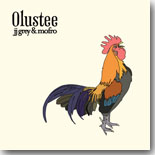 Olustee
(Alligator Records) is JJ Grey & Mofro’s
tenth release, their first new album in nine
years. However, the band’s swampy mix of
blues, soul, rock, and funk remains intact.
Grey serves as producer for the first time
and Mofro expands, adding an orchestra to
several of the 11 tracks, 10 of which were
written by Grey, reflecting his usual
personal touch. Olustee
(Alligator Records) is JJ Grey & Mofro’s
tenth release, their first new album in nine
years. However, the band’s swampy mix of
blues, soul, rock, and funk remains intact.
Grey serves as producer for the first time
and Mofro expands, adding an orchestra to
several of the 11 tracks, 10 of which were
written by Grey, reflecting his usual
personal touch.
“The Sea” opens the album, a peaceful ballad
with Grey’s haunting falsetto and acoustic
guitar backed by strings and piano that
paints a wonderful picture of the calming
effects of the sea. You can almost hear the
waves coming to shore. “Top of the World” is
soulful, funky blues that sounds and feels
like a long-lost Little Feat track, and the
lovely “On a Breeze” is a gentle ballad that
just seems to float through the air like its
title.
The title track is a driving blues rocker
with funky undertones, a harrowing tale of a
desperate race to outrun a raging wildfire.
Grey delivers a powerful cover of John
Anderson’s early ’90s country hit “Seminole
Wind,” reflecting on the damage done to the
environment over the years by industry and
development.
The album’s first single, “Wonderland,” is a
delightful soul burner with horns, backing
vocals, B3, and ringing guitars, while
“Starry Night” is a splendid slow blues
highlighted by strings and sweet vocals from
Grey and the backing vocalists, and the
freewheeling, funky “Free High” fondly
recalls the days of listening to tunes on
the turntable. The ballad “Waiting”
addresses procrastination and getting on
with life, highlighted by Grey’s soulful
vocal.
“Rooster” is an entertaining track with
Grey’s feisty rap vocal against a funk/rock
backdrop, surely coming to a movie
soundtrack in your near future. The
reflective ballad, “Deeper Than Belief,”
brings the disc to a satisfying conclusion.
It’s great to have a new release from JJ
Grey & Mofro, and Olustee makes the
wait worthwhile. The alternating track
sequence (ballad/rocker) works very well and
Grey’s songwriting and his vocals are superb
throughout. Hopefully, we won’t have to wait
nine years for the next one.
--- Graham
Clarke
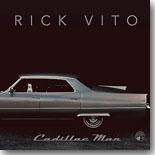 Rick
Vito is probably best known for his
tenure as guitarist for Fleetwood Mac from
1987 until 1991, where he helped revive the
blues and roots vibe of the earliest
incarnation of the legendary band. He also
teamed with Mick Fleetwood as part of the
Mick Fleetwood Blues Band, and has played
lead and slide guitar for numerous artists
from Bob Seger (“Like A Rock”) to Bonnie
Raitt to John Mayall to John Prine to Albert
Collins. Also a songwriter of note, his
“It’s Two A.M.,” performed by Shemekia
Copeland, won the W.C. Handy Blues Award for
Song of the Year in 2001. Rick
Vito is probably best known for his
tenure as guitarist for Fleetwood Mac from
1987 until 1991, where he helped revive the
blues and roots vibe of the earliest
incarnation of the legendary band. He also
teamed with Mick Fleetwood as part of the
Mick Fleetwood Blues Band, and has played
lead and slide guitar for numerous artists
from Bob Seger (“Like A Rock”) to Bonnie
Raitt to John Mayall to John Prine to Albert
Collins. Also a songwriter of note, his
“It’s Two A.M.,” performed by Shemekia
Copeland, won the W.C. Handy Blues Award for
Song of the Year in 2001.
He’s also found time to release ten solo
albums since 1992, the latest being
Cadillac Man (Blue Heart Records), a
wonderful set featuring 12 tracks (11
originals) spanning blues, roots, rock, and
soul. Vito plays all guitars and bass on 11
tracks, backed by drummers Lynn Williams,
Rick Reed, and Charles “Mojo” Johnson, along
with B3 master Kevin McKendree, with
harmonica ace Steve Marriner, saxophonist
Jim Hoke, and Charlie Harrison, who plays
bass on one track.
The snappy shuffle, “Love Crazy Baby,” kicks
off the album with Vito’s splendid slide
guitar work front and center. His Handy
winner, the soulful blues “It’s 2 A.M.”
follows, leading into the jaunty, rocking n’
rolling title track that would have been a
solid fit in Chuck Berry’s catalog.
The atmospheric “Little Sheba” describes a
mysterious femme fatale, Vito’s haunting
slide guitar work punctuating his story.
That slide is also featured prominently on
the first instrumental, a funky number
called “Bo In Paradise.”
The lively “Gone Like A Cool Breeze” is a
swinging, pop-flavored tune, while “Crying
At Midnight” is a somber blues ballad with a
fine Vito vocal to accompany his pristine
guitar work. “Barbeque’n Baby” is a bluesy
shuffle with exuberant slide guitar and
harmony vocals which add a country feel. The
second instrumental is a lovely
interpretation of Sam Cooke’s “Just Another
Day,” from his Soul Stirrer days, with
Vito’s slide guitar just amazing on this
track.
The gentle, flowing “River’s Calling” is a
moody piece that teams Vito’s plaintive
vocal with his equally mournful slide work.
The entertaining “You Can’t Stop A Guitar
(From Playing The Blues)” drops a few blues
guitar legends while Vito’s guitar soars,
and the third instrumental, “Sliding Into
Blues,” is a relaxing track that brings the
album to a satisfying conclusion.
Simply put, if you dig the blues and slide
guitar, there’s plenty of both on
Cadillac Man to get you through the day.
Rick Vito has another winner on his hands
with this excellent release.
--- Graham
Clarke
 Leo
Lyons has been playing music
professionally since 1960, when he was 16
years old, and began playing bass with
singer/guitarist Alvin Lee in The Jaybirds.
The Jaybirds changed their name to Ten Years
After in 1967, and the rest, as they say, is
history. Ten Years After gave many memorable
performances during the late ’60s, most
notably their stunning rendition of “I’m
Going Home” at Woodstock in 1969, and are
also remembered for the UK hit “Love Like A
Man” and their biggest worldwide hit, “I’d
Love To Change The World.” Leo
Lyons has been playing music
professionally since 1960, when he was 16
years old, and began playing bass with
singer/guitarist Alvin Lee in The Jaybirds.
The Jaybirds changed their name to Ten Years
After in 1967, and the rest, as they say, is
history. Ten Years After gave many memorable
performances during the late ’60s, most
notably their stunning rendition of “I’m
Going Home” at Woodstock in 1969, and are
also remembered for the UK hit “Love Like A
Man” and their biggest worldwide hit, “I’d
Love To Change The World.”
Following Ten Years After’s break-up in
1974, Lyons became a producer, working with
artists like UFO, Motörhead, and Richard and
Linda Thompson, among others. He later
worked as a staff songwriter for the
Nashville publisher Hayes Street Music. He
also recorded several albums, two with his
band Kick. He rejoined a reformed Ten Years
After for a decade beginning in 2003. Since
leaving, Lyons formed Hundred Seventy Split
with former Ten Years After singer/guitarist
Joe Gooch and drummer Damon Sawyer.
Movin’ On (Flatiron Recordings) is
the band’s seventh release, featuring ten
songs written by Lyons with Gooch or
Nashville tunesmith Fred Koller. Lyons’
former Kick bandmates Andy Nye and Tony
Crooks also collaborate on a couple of
songs.
Lyons and Gooch wrote the opener, “Walking
In The Devil’s Shoes,” a thunderous blues
rocker that updates the Robert Johnson at
the Crossroads theme. You can feel Lyons’
rumbling bass line in your bones. The
swinging “It’s So Easy To Slide” is a
free-wheeling shuffle that features all
three musicians prominently.
“The Heart of a Hurricane” is a catchy tune
that has the feel of an ’80s soundtrack
tune, as does Gooch’s vocal, while “Black
River” is a moody mid-tempo blues, and “Mad,
Bad and Dangerous” is a terrific
hard-charging boogie rocker in the TYA
tradition that adds Hammond organ from Bob
Hadrell.
“The Road Back Home” is an old school
classic rocker reflecting on the past
highlighted by Gooch’s catchy guitar riffs
and strong vocal. “Meet Me at the Bottom” is
a lively acoustic blues that’s a lot of fun,
and the scrappy “Sounded Like a Train”
vividly recounts the 2023 Nashville tornado.
Gooch’s deft guitar work is showcased on the
semi-acoustic “Beneath That Muddy Water,”
which has a steamy, sweaty Delta feel, and
the closer “Time To Kill” is a crisp,
irresistible rock n’ roller.
Movin’ On is an entertaining set of
blues and rock that will please fans of both
genres. Leo Lyons, at 80 years old, still
has a tiger in his tank and a great band
that keeps their foot to the pedal.
--- Graham
Clarke
 I
first heard Mitch Ryder in the early
’80s, when he had a hit with a cover of
Prince’s “When You Were Mine.” A few years
later, I heard his “Devil With A Blue
Dress/Good Golly Miss Molly” on the mid-’80s
television show Moonlighting, which
led me to backtrack to his earlier body of
work, where his combination of blue-eyed
soul and rock n’ roll led to several hits in
the mid ’60s. I
first heard Mitch Ryder in the early
’80s, when he had a hit with a cover of
Prince’s “When You Were Mine.” A few years
later, I heard his “Devil With A Blue
Dress/Good Golly Miss Molly” on the mid-’80s
television show Moonlighting, which
led me to backtrack to his earlier body of
work, where his combination of blue-eyed
soul and rock n’ roll led to several hits in
the mid ’60s.
Ryder has influenced numerous rockers, such
as John Mellencamp (who produced “When You
Were Mine” as well as the accompanying
album, Never Kick A Sleeping Dog),
Bob Segar, Ted Nugent, and Bruce
Springsteen, who often performs a “Detroit
Medley” of Ryder tunes in concert.
Though he’s been basically limited to the
nostalgia circuit in the U.S. for many
years, Ryder retains a big following in
Europe, most notably Germany, where he’s
recorded many of his most recent albums,
including his latest. The Roof is on Fire
(Ruf Records) is a two-CD live set recorded
during a series of 2019 and 2020 German
tours celebrating his 75th birthday,
Ryder is backed by a powerhouse band with
two guitarists (Gisbert “Pitti” Piatkowski
and Heiner Witte), bassist Manne Pokrandt,
drummer Tobias Ridder, keyboardist Wolfram
“Boddi” Bodag, and multi-instrumentalist
Rene Decker. Ryder wrote nine of the 15
tracks featured on this set, and though his
voice is coarser than his hit making days,
he still projects that same energy and
passion that highlighted his earlier work,
and it’s obvious the crowd is digging the
show.
Ryder’s originals don’t include any of his
familiar hits, but the opener, “Betty’s Too
Tight,” on "TUFF," the first disc, is a
gritty, fast-paced rocker. The follow-up,
“Tough Kid,” doesn’t slow the pace at all,
with scorching slide guitar, harmonica from
Decker, and a relentless driving rhythm. The
breathless pace continues with a nice cover
of “Subterranean Homesick Blues,” which is
played even faster than Bob Dylan’s
original.
“Bang Bang” is a tough anti-war tune that
hits home based on current events, and the
pace eases ever so slightly with the biting
“Ain’t Nobody White.” The remainder of that
line is “can sing the blues,” which has
surely provoked a few debates over the years
since Ryder first recorded it. There’s also
a rock-solid cover of the Fabulous
Thunderbirds’ hit, “Tuff Enuff,” straddling
blues and rock like the original, with extra
harp work on this version from Decker.
“From A Buick 6,” the second Dylan cover,
finally slows things down, but Ryder and the
band manage to keep the intensity level
high. The band has an opportunity to stretch
out on this track with guitar, harmonica,
and keyboards getting some time in the
spotlight. Ryder and the band wrap up CD 1
with a powerful take of The Rolling Stones’
“Heart Of Stone,” with the audience also
contributing.
Disc 2 is titled “SOFT” and features seven
songs, five written by Ryder, beginning with
the introspective “Freezin’ In Hell,” where
Ryder goes from a whisper to a
throat-shredding scream and back to the
appreciation of the audience. He pours his
heart into the next song as well, “All The
Fool It Sees,” mixing tough and tender to
powerful effect, and “If You Need The Pain,”
where Ryder takes a more understated vocal
approach backed by Bodag’s piano.
The cover of Jimmy Cliff’s classic “Many
River To Cross” is highlighted by Bodag’s
gospel-like approach on organ, with Ryder
doing a fine job with the vocal, adding to
the gospel feel. The world-weary “Star
Nomore” is a nice, understated performance,
pondering the difficulties of being on the
road and longing for a more grounded
existence. The somewhat twisted “Red Scar
Eyes,” originally recorded for a German
label in the early ’80s, seems to be a crowd
favorite.
Disc 2 closes with The Doors’ classic “Soul
Kitchen,” which Ryder and the band stretch
out to nearly 16 minutes. There’s lots of
musical interplay by the band which works
very well, nothing really drags out during
the song, and Ryder’s vocal approach is a
pretty good match for Jim Morrison’s in all
ways. There’s a “radio” version of “Ain’t
Nobody White” that follows this tune.
I have to admit that Ryder’s vocals took me
a bit by surprise at first, since I haven’t
really heard him in years, but, overall,
The Roof is on Fire is a very strong
live set, as he still retains that boundless
energy and enthusiasm that first enthralled
audiences 60 years ago. I really like the
fact that he avoided a “Greatest Hits”
approach to this release, opting to share
some great music that many of his classic
era fans might not have been familiar with,
as well as some well-chosen covers.
--- Graham
Clarke
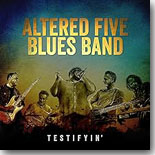 At
long last, we have a new recording from the
crack Milwaukee group, Altered Five Blues
Band. Testifyin' (Blind Pig
Records) isn't a full album, but rather a
five-song EP produced by Tom Hambridge. I'll
settle for it because Jeff Taylor and the
boys have given us five really strong
numbers. We were teased nearly two years ago
when the single "Great Minds Drink Alike"
came out (reviewed
here), thinking that a full album would
follow shortly thereafter. With Blind Pig
ramping back up with a lot of intriguing
releases planned for later in the year, we
can hope that there will be more Altered
Five songs to follow. At
long last, we have a new recording from the
crack Milwaukee group, Altered Five Blues
Band. Testifyin' (Blind Pig
Records) isn't a full album, but rather a
five-song EP produced by Tom Hambridge. I'll
settle for it because Jeff Taylor and the
boys have given us five really strong
numbers. We were teased nearly two years ago
when the single "Great Minds Drink Alike"
came out (reviewed
here), thinking that a full album would
follow shortly thereafter. With Blind Pig
ramping back up with a lot of intriguing
releases planned for later in the year, we
can hope that there will be more Altered
Five songs to follow.
Singer Jeff Taylor is backed by his regular
working band, a solid, tight group
consisting of Jeff Schroedl (guitar), Mark
Solveson (bass), Steve Huebler (keyboards),
and Alan Arber (drums). Jason Ricci joins in
on harmonica on three of the cuts. There's
also a horn section that's not mentioned on
the EP back cover, but rest assured whoever
they brought to the studio can play.
I'm a big fan of Taylor's voice. To coin an
over-used phrase, he'd sound good singing
the phone book. (I just dated myself,
because who uses phone books in this
century?). He's got a booming voice that
emphasizes whatever issue he's singing
about.
Testifyin' starts with "Don't Tell Me
I Can't," with Taylor having all the
confidence in the world that he'll have it
all. The horns blast away throughout and
Schroedl contributes snaky blues guitar
before later laying down a strong solo. The
slow blues "Whiskey Got Me Married" has
Taylor admitting that the bottle told him
what to do instead of following his heart,
with a bottle of Johnny Walker and that
cinnamon brunette in Las Vegas ("... She was
a cold-blooded kisser, held nothin' back
...") was his downfall, as he and that woman
obviously found their way to one of the many
Sin City wedding chapels. Ricci makes his
first appearance with solid harmonica
interludes.
"Brand New Bone" opens with a slow
instrumental piece from guitar and
harmonica, leading into a plodding shuffle
as Taylor sings about not being able to
leave that woman alone. Heubler shines with
his piano solo midway through the tune. Up
next is my fave on this abbreviated album,
the slow blues "I've Got The Scars To Prove
It." We all feel the pain in Taylor's
voice, echoed by Schroedl's guitar licks.
The guitar-playing Jeff provides the
highlight with an absolutely killer solo
while Huebler's organ provides the
underlying foundation.
"You Can't Win (If It Ain't Within)" is
Taylor's effort to get us to be the best
that we can be. Or something like that. It's
subject to interpretation. Schroedl again
lays down some smokin' guitar tracks
throughout. And with that, we're done here.
The Testifyin' album ends as strongly
as it began.
I've never seen this band live, but I have
to believe they put on a killer show. I've
begged with Jeff Schroedl to get them down
to Arizona someday, so maybe that will
happen before long. In the meantime, I'll
continually groove to their many albums,
with Testifyin' the latest in a rich
blues catalog.
--- Bill
Mitchell
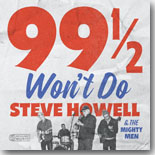 It’s
always a great day when a new release from
Steve Howell & The Mighty Men
arrives. The Texas troubadour’s catalog
includes albums that are full of great and
unique interpretations of classic songs that
range from blues to gospel to jazz to
country to pop and soul. Their latest
release, 99 ½ Won’t Do (Out of the
Past Music) is a perfect example of this
band’s musical M.O., with ten well-chosen
tunes that span all of those genres. Howell
can’t lose with his deft guitar work and
warm vocals, along with the superb support
of The Mighty Men (Chris Michaels – electric
guitar, Dave Hoffpauir – drums, and Jason
Weinheimer – bass/keys). It’s
always a great day when a new release from
Steve Howell & The Mighty Men
arrives. The Texas troubadour’s catalog
includes albums that are full of great and
unique interpretations of classic songs that
range from blues to gospel to jazz to
country to pop and soul. Their latest
release, 99 ½ Won’t Do (Out of the
Past Music) is a perfect example of this
band’s musical M.O., with ten well-chosen
tunes that span all of those genres. Howell
can’t lose with his deft guitar work and
warm vocals, along with the superb support
of The Mighty Men (Chris Michaels – electric
guitar, Dave Hoffpauir – drums, and Jason
Weinheimer – bass/keys).
The set opens with one of my favorite,
relatively unheralded Chess sides, “I’m A
Little Mixed Up,” originally recorded by
Betty James in 1961. Howell and the band
have almost as much fun with this version as
James and her family (husband on guitar, son
on bass) did. The title track is a relaxed
version of an old gospel favorite, recorded
by Dorothy Love Coates, Sister Rosetta
Tharpe, and later modified by Wilson
Pickett.
Howell and company also include four
instrumentals on the album, which is never a
bad thing. The first two are “San
Francisco,” a lovely and delicate version of
the 1967 Scott McKenzie hit, and a laid-back
read of “Don’t Let Me Be Misunderstood,”
another ’60s favorite that features a guitar
duet between Howell and Michaels. The R&B
ballad “Talk To Me,” originally released by
Little Willie John in the late ’50s, gets a
sweet soulful presentation.
The gospel song, “God’s Gonna Cut You Down,”
has been recorded in a variety of genres
over the years, with Howell’s gently
swinging version a real toe tapper. It’s
never a bad thing to include a Charlie Rich
song on an album, and Howell selects one of
Rich’s finest, a keeper from his Sun Records
days, “Who Will The Next Fool Be?”
Charley Patton’s “Stone Pony Blues” is
updated nicely, and the final two tracks are
both instrumentals, a gentle cover of The
Left Banke’s 1966 “Walk Away Renee,” and the
1960’s rock instrumental hit, “Apache.”
One of my favorite things about Steve
Howell’s albums is that in addition to
getting to hear some mighty fine music, I
always find myself tracking down the old
songs that I am unfamiliar with. Trust me,
if you dig excellent guitar and warm
performances, you need to check out Steve
Howell & The Mighty Men, and 99 ½ Won’t
Do is a great place to start.
--- Graham
Clarke
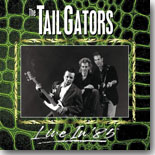 Way
back in the late ’80s, I was thumbing
through a record catalog (man, do I miss
those!) and ran across an album by a band
out of Austin, Texas called The Tail
Gators. Based on some of the comments
and feedback, I decided to give them a try.
Thirty-five years later, they remain one of
my favorite bands. Their sound was a
combination of blues, rock, surf,
rockabilly, Cajun, and zydeco. I wasn’t
familiar with several of those styles at the
time, but The Tail Gators’ music inspired to
dig into those genres. Way
back in the late ’80s, I was thumbing
through a record catalog (man, do I miss
those!) and ran across an album by a band
out of Austin, Texas called The Tail
Gators. Based on some of the comments
and feedback, I decided to give them a try.
Thirty-five years later, they remain one of
my favorite bands. Their sound was a
combination of blues, rock, surf,
rockabilly, Cajun, and zydeco. I wasn’t
familiar with several of those styles at the
time, but The Tail Gators’ music inspired to
dig into those genres.
Over about a dozen years The Tail Gators
released seven albums, all of them
outstanding to these ears, before going
their separate ways. The main ‘Gator was
founder Don Leady, a LeRoi Brothers alum,
who sang, played guitar, fiddle, and
accordion. Leady was influenced by a variety
of musicians, ranging from Chet Atkins, B.B.
King, Les Paul, Duane Eddy, Link Wray, and
Nashville session guitarist Joe Maphis.
Initially joining Leady were bassist and
former Fabulous Thunderbird Keith Ferguson
and drummer Gary “Mudcat” Smith.
Leady recently unearthed some live
recordings that the band cut at different
venues in October 1985. These tracks were
recorded from soundboards to cassettes,
transferred and remastered. An LP with seven
tracks was issued at the end of 2023, but
the set is now available on CD, with 10
additional tracks, as The Tail Gators –
Live in ’85 (LeRay Records). I’d always
heard about their rough and rowdy live
shows, so this was an opportunity to hear it
first-hand.
Nine of the tracks appeared on the first
four Tail Gators releases. “Pick Up The
Deck, “Brown Eyed Girl,” “They Call Me
Rockin’,” and the show closer, “Rock & Roll
‘till The Cows Come Home,” all showed up on
the band’s 1985 debut album, Swamp Rock.
Al Ferrier’s “Yard Dog” is taken from their
1986 follow-up, Mumbo Jumbo, and Hank
Mizell’s rockabilly classic “Jungle Rock”
and Hank Ballard’s “Tore Up” are from 1987’s
Tore Up (a compilation of extra
tracks their label, Wrestler Records,
recorded for the first two albums).
The swampy cover of Clarence Garlow’s “Crawfishin’”
appeared a few years later on their 1988
release for Restless Records. Ok Let’s
Go!, and surf guitarist Al Casey’s
instrumental “Ramrod” finally appeared on
1992’s Swamp’s Up for Upstart
Records. All of these tunes were album
favorites to their fans and guaranteed to
get audiences moving at live performances.
Other songs include the mid-tempo “Thinkin’
About You,” a wild version of Tarhill Slim’s
classic “Wildcat Tamer,” a slow burning take
of “Sea of Love,” a gritty read of Ronnie
Self’s “Ain’t I’m A Dog” combined with a
guitar-driven cover of James Brown’s
instrumental “Hold It,” Chuck Berry’s
“Promised Land,” a splendid remake of Santo
and Johnny’s “Sleepwalk,” “Secret Weapon”
(actually Lazy Lester’s “If You Think I’ve
Lost You”), and Chuck Dallis’ “Moon Twist”
(a favorite from Leady’s LeRoi Brothers
days).
Although the tracks come from different
shows and the sound quality varies a tiny
bit between songs, Live in ’85 proves
beyond a doubt that The Tail Gators knew how
to put on a show. If you’re not familiar
with their catalog, this is a great place to
start and will probably encourage you to
track down their earlier releases. If you
are a fan, this is a great way to hear “new”
Tail Gators product.. Leady still performs
as The Tail Gators occasionally, but with a
new rhythm section, as Ferguson passed away
in 1997 and Smith moved on around the same
time.
--- Graham
Clarke
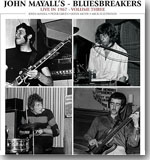 Live
in 1967, Volume 3 (Forty Below Records)
is the final set of tunes capturing one of
John Mayall’s Bluesbreakers’ most
potent but shortest-lived editions of the
band, with Mayall (vocals, harmonica, organ)
leading Peter Green (guitar), John McVie
(bass), and Mick Fleetwood (drums). The trio
of Green, McVie, and Fleetwood would leave
soon after these recordings to form
Fleetwood Mac. This particular assemblage of
the Bluesbreakers were only together about
three months, so these three volumes of live
recordings are pretty much all fans have to
verify their existence, other than a few
tracks that were later included on an
expanded release of the band’s 1967 studio
effort, A Hard Road. Live
in 1967, Volume 3 (Forty Below Records)
is the final set of tunes capturing one of
John Mayall’s Bluesbreakers’ most
potent but shortest-lived editions of the
band, with Mayall (vocals, harmonica, organ)
leading Peter Green (guitar), John McVie
(bass), and Mick Fleetwood (drums). The trio
of Green, McVie, and Fleetwood would leave
soon after these recordings to form
Fleetwood Mac. This particular assemblage of
the Bluesbreakers were only together about
three months, so these three volumes of live
recordings are pretty much all fans have to
verify their existence, other than a few
tracks that were later included on an
expanded release of the band’s 1967 studio
effort, A Hard Road.
Fortunately, Tom Huissen, a young Dutch fan,
snuck a one-channel reel-to-reel tape
recorder to five different Bluesbreaker
performances between February and May of
1967. Mayall acquired these recordings and
he and Forty Below label head Eric Corne
painstakingly restored them, with Volume 1
being released in 2015 and Volume 2 in 2016.
Like the previous two volumes, the sound is
not high fidelity and these are the muddiest
of the lot. Still, Mayall and Corne did an
excellent job, considering what they were
working with, to the point that it really
doesn’t take anything from the excellent
music being played.
There are only nine selections on Volume 3,
compared to 13 apiece on the previous two
volumes, and eight of the songs are
duplicated on the previous volumes as well (Mayall’s
“Brand New Start” and “Tears In My Eyes,”
Sonny Boy Williamson’s “Your Funeral and My
Trial,” J.B. Lenoir’s “Talk To Your
Daughter,” Freddy King’s instrumental “The
Stumble,” Green’s “Greeny,” and Otis Rush’s
“Double Trouble.” The lone “newcomer” to the
set list is Mayall’s “Stand Back Baby,”
which maybe has the worst sound quality, but
Peter Green’s guitar work still shines
through.
Green makes his presence known on every one
of these tracks. Only 21 at the time, he
pulls out all the stops whenever he has the
opportunity, and it’s a shame that this
ensemble didn’t have more of an opportunity
to play together. However, each member went
on to craft some superb blues and rock music
in their later bands. McVie and Fleetwood
are rock solid with their rhythm support,
and Mayall is, well, Mayall. There’s a
reason he’s called the Godfather of British
Blues, and it’s shown on these tracks.
Since nearly all of these songs appear on
the previous volumes and the sound is not
quite as sharp on this set, Live in 1967.
Volume 3 may not be as essential to
blues fans as the first two volumes, but
it’s still a great opportunity to hear one
of the lesser known British blues bands of
the ’60s in top form.
--- Graham
Clarke
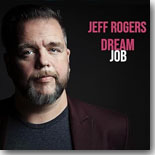 Canadian
singer/songwriter/keyboardist Jeff Rogers
traveled to Muscle Shoals, Alabama to record
his latest album, Dream Job (Diesel
Entertainment). An Ottawa native, Rogers is
an in-demand session player, mastering his
craft over the past two decades, playing
clubs and festivals throughout Canada as a
solo artist and as a member of the
country/rock band The Cooper Brothers, also
winning the 2020 I.B.C. as a member of
HOROJO Trio. Canadian
singer/songwriter/keyboardist Jeff Rogers
traveled to Muscle Shoals, Alabama to record
his latest album, Dream Job (Diesel
Entertainment). An Ottawa native, Rogers is
an in-demand session player, mastering his
craft over the past two decades, playing
clubs and festivals throughout Canada as a
solo artist and as a member of the
country/rock band The Cooper Brothers, also
winning the 2020 I.B.C. as a member of
HOROJO Trio.
Dream Job offers nine original tracks
written by Rogers and musical partner (and
fellow Cooper Brother) Dick Cooper, who
co-produced the album with Rogers.
Contributing musicians include guitarist
Kelvin Holly, keyboardist Clayton Ivey,
drummer Justin Holder, bassist Shonna
Tucker, and backing vocalists Sherri Harding
and Rebecca Noelle, with guest appearances
from guitarist Colin Linden and singer
Kellylee Evans.
The opener, “Her Kind of Trouble,” is a deep
soul/blues ballad about hard times and the
irresistible woman who may be responsible
for some of those times. “Lock & Key” is the
album’s first single and it’s a tough
poppish rocker, with guitar work from Holly
and a hard-charging horn section.
The soaring title track is a ballad driven
by Rogers’ vocal and keyboards and an
awesome choir (who also appear on a couple
of other tracks), and Linden contributes
slide guitar to the Second Line stepper
“Mind of Your Own.”
Blues fans will dig the smoky slow burner
“Wish You Wouldn’t Go,” highlighted by
Holly’s sterling fretwork, the horns, and
Rogers’ Wurlitzer and vocals. “Saving This
Bottle of Wine” sounds like a classic Muscle
Shoals track with its deft mixture of
country and soul. “Dead of Night” has a
Memphis Staxian feel with the horns and
keyboards.
Kellylee Evans joins Rogers for “Worth The
Wait,” a textbook example of sweet soul
music, and the gospel-flavored closer “Deep
Cold Water” makes great use of the
aforementioned choir.
Rogers has a distinctive vocal style that is
a snug fit with blues, country, and soul,
and his songwriting is first rate. Dream
Job is a fine release that will
certainly satisfy fans of those genres.
--- Graham
Clarke
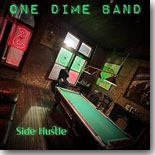 One
Dime Band is an acoustic duo (John
Brauchler – guitar, resonator, banjo, and
Paul Gallucci – vocals, harmonica,
percussion, rhythm guitar) based in Boston.
The duo won the Boston Blues Society Blues
Challenge in 2022, the Granite State Blues
Society Blues Challenge in 2023, and made
the semi-finals at the International Blues
Challenge in 2024. They are backed by Romeo
Dubois (drums), Paul Kochanski (bass),
Alizon Lissance (keyboards), Ilana Katz Katz
(fiddle), Holly Harris (percussion), Johnny
Blue Horn (trumpet), Mario Perrett (saxes)
with Robin Hathaway and Tim Curry providing
additional vocals. One
Dime Band is an acoustic duo (John
Brauchler – guitar, resonator, banjo, and
Paul Gallucci – vocals, harmonica,
percussion, rhythm guitar) based in Boston.
The duo won the Boston Blues Society Blues
Challenge in 2022, the Granite State Blues
Society Blues Challenge in 2023, and made
the semi-finals at the International Blues
Challenge in 2024. They are backed by Romeo
Dubois (drums), Paul Kochanski (bass),
Alizon Lissance (keyboards), Ilana Katz Katz
(fiddle), Holly Harris (percussion), Johnny
Blue Horn (trumpet), Mario Perrett (saxes)
with Robin Hathaway and Tim Curry providing
additional vocals.
Side Hustle is One Dime Band’s fourth
release, featuring 13 original tracks that
touch on a variety of styles while remaining
deeply rooted in the blues. The
Memphis-flavored title track opens the disc,
with horns, keyboards and a greasy funk
feel.
The swampy blues “Blackfoot Sun” features
Brauchler’s resonator and Katz’s fiddle, and
“Mockingbird Way” ventures toward ’50s-era
rock n’ roll, before the fine and mellow
“What You Done?” shifts back to the blues
with resonator and Lissance’s accordion.
“Ain’t No Faker” showcases Lissance’s piano
work and Gallucci’s vocals and harmonica,
and the ominous “Dr. Shine” is a haunting
blues about getting away from the real
world. The jaunty “Brooklyn Town” has a
vintage jazz feel with banjo from Brauchler,
Kolchanski’s upright bass, and muted trumpet
from Johnny Blue Horn, and “Backbell” is an
old school rock n’ roller with classic
wailing sax from Perrett and piano from
Lissance.
“Soul To Keep” is a soulful slow burner that
teams Gallucci with Robin Hathaway on
vocals, “Babylon Clouds” is a greasy blues
highlighted by Gallucci’s deft harp play and
Braucher’s fretwork, and “Cemetery Waltz” is
a dreamy Americana piece with resonator and
fiddle in the spotlight.
The greasy instrumental “Rib Grease” mixes
Stax and New Orleans funk seamlessly, and
the closer, “Gator In My Pond,” is the most
downhome blues on the disc and wraps things
up as effectively as possible.
One Dime Band’s Side Hustle is a most
enjoyable album with a perfect mix of
traditional and contemporary blues and soul.
Great songs and performances make this one a
must-hear for blues fans.
--- Graham
Clarke
 Stevie
J Blues’ latest album is a seven-song
EP, Let’s Get Back To Love (PK Music
Group) that hit stores just in time for
Valentine’s Day. The EP features three tunes
he recently released, all of which went to
number one on the Soul/Blues charts (the
rocking soul tune “Leaving Me,” the Marvin
Gaye tribute “Like Marvin,” and the Womack-esque
“You Got That Love”), all previously
reviewed by Blues Bytes, plus four brand new
songs. Stevie
J Blues’ latest album is a seven-song
EP, Let’s Get Back To Love (PK Music
Group) that hit stores just in time for
Valentine’s Day. The EP features three tunes
he recently released, all of which went to
number one on the Soul/Blues charts (the
rocking soul tune “Leaving Me,” the Marvin
Gaye tribute “Like Marvin,” and the Womack-esque
“You Got That Love”), all previously
reviewed by Blues Bytes, plus four brand new
songs.
“Real Love” is the next single on the album,
a thick slice of sweet Southern soul that
should join its mates near the top of the
charts, if it hasn’t already. “Somebody Tell
Me” is more mid-tempo over a funky backdrop
and some of Stevie J’s stinging guitar work
mixed in.
“Biscuits and Gravy” is a slow and soulful
downhome blues like they used to play them,
and the title track is a cool R&B track that
reflects on first love and rekindling the
flame, giving a nod to Teddy Pendergrass in
the process.
Let’s Get Back To Love will
definitely satisfy Stevie J Blues’ fanbase,
but it should easily add a few more
soul/blues fans to that base.
--- Graham
Clarke
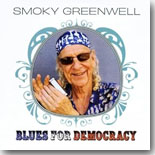 One
thing about political activism in music is
that sometimes each side may think the song
is talking about the other side. That will
probably be the case with several selections
on Smoky Greenwell’s Blues For
Democracy (Greenwell Records), because
if you really look into politics, it’s never
really just one side or the other doing the
things that you’re disgusted with. Many of
these songs work the same way. One
thing about political activism in music is
that sometimes each side may think the song
is talking about the other side. That will
probably be the case with several selections
on Smoky Greenwell’s Blues For
Democracy (Greenwell Records), because
if you really look into politics, it’s never
really just one side or the other doing the
things that you’re disgusted with. Many of
these songs work the same way.
On tracks like “Fillibuster Blues,” “Liars,
Cheaters, and Losers,” (both new songs) and
“Slow Moving Coup,” either side of the
political aisle can easily picture the other
side doing what Greenwell is describing.
That’s not exactly a new concept, for sure,
but it shows that the deceit and chicanery
goes deeper than most imagine, and both ways
to boot.
Several of these tracks actually are pleas
for the public and the folks in government
to stop the insanity (“Common Ground,” and
Wilbert Harrison’s “Let’s Work Together”).
He also encourages everyone to “Get Out And
Vote,” which is the minimum any citizen can
do to make a difference, and “99% Blues” is
a true group effort, a rocking, rollicking
blues with several vocalists taking turn
deriding the Citizens United SCOTUS
decision.
Greenwell’s first political song, “Between
Iraq and a Hard Place,” is featured here as
well, and “Homeless Christmas” is a
fast-paced blues where Greenwell calls
attention to the plight of those less
fortunate during the holidays.
Some political albums tend to alienate one
side of the other of the political spectrum,
but that doesn’t really happen with Blues
For Democracy….there’s plenty of blame to go
around for the current state of affairs.
Smoky Greenwell gets that and does a fine
job relaying it to blues fans, while playing
some mighty fine blues along the way.
--- Graham
Clarke
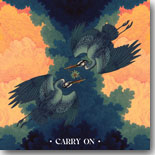 Dutch
blues rockers Harlem Lake (Janne
Timmer – vocals, Dave Warmerdam –
organ/Rhodes/backing vocals, Sonny Ray Van
den Berg – guitar, Benjamin Torbijn – drums,
Kjelt Ostendorf – bass/backing vocals) won
the European Blues Challenge in 2022. While
their sound incorporates blues, rock, and
Americana, singer Timmer brings a nice bit
of soul to her vocals. Dutch
blues rockers Harlem Lake (Janne
Timmer – vocals, Dave Warmerdam –
organ/Rhodes/backing vocals, Sonny Ray Van
den Berg – guitar, Benjamin Torbijn – drums,
Kjelt Ostendorf – bass/backing vocals) won
the European Blues Challenge in 2022. While
their sound incorporates blues, rock, and
Americana, singer Timmer brings a nice bit
of soul to her vocals.
They have an upcoming album available in the
spring (A Fool’s Paradise, Vol. 2),
and have recently issued a single from the
album. “Carry On” is a gritty rocking blues
that adds horns (Thomas Heikoop, Jazzton
Hulsebosch, and Maarten Combrink) and
backing vocals (Megan Zinschitz and Ashley
de Jong) for a dash of soul. Timmer’s
powerful vocal and Van den Berg’s crunching
guitar tone carry the day
--- Graham
Clarke
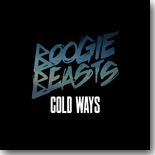 The
Belgian band Boogie Beasts’ sound has
been described as “alternative blues rock,”
taking their love for the downhome, raw
blues and adding bits of other genres to the
mix, such as soul, gospel, rock, R&B, and
even a little hip-hop. The
Belgian band Boogie Beasts’ sound has
been described as “alternative blues rock,”
taking their love for the downhome, raw
blues and adding bits of other genres to the
mix, such as soul, gospel, rock, R&B, and
even a little hip-hop.
The band (Jan Jaspers – guitar/vocals,
Patrick Louis – guitar/vocals, Fabian
Bennardo – harmonica, Gert Servaes – drums)
has an upcoming album release, Neon Skies
& Different Highs, on April 19th, but
recently dropped the first single, “Cold
Ways” (Naked Records) to give listeners a
taste of what’s to come. A driving shuffle
with eerie slide guitar, Louis’ ominous
vocal, a distinctive chorus, and Bennardo’s
harp, “Cold Ways” is a great sign that the
upcoming album will be one to look forward
to.
--- Graham
Clarke
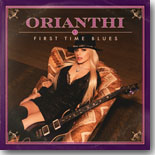 Born
in Australia, Los Angeles-based guitarist
Orianthi began playing guitar
professionally at age 13, performing and
touring with Carlos Santana, Steve Vai,
Alice Cooper, Richie Sambora, and Dave
Stewart. She was a member of the Hollywood
Vampires and has recorded five solo albums
in addition to serving as Carrie Underwood’s
guitarist. Born
in Australia, Los Angeles-based guitarist
Orianthi began playing guitar
professionally at age 13, performing and
touring with Carlos Santana, Steve Vai,
Alice Cooper, Richie Sambora, and Dave
Stewart. She was a member of the Hollywood
Vampires and has recorded five solo albums
in addition to serving as Carrie Underwood’s
guitarist.
Having recently signed with Woodward Avenue
Records, Orianthi recently released a
single, “First Time Blues,” which features
guest guitarist Joe Bonamassa with Justin
Andres (bass/vocals), Carey Frank (keys),
Nick Maybury (electric/acoustic guitars),
and Elias Mallin (drums).
Orianthi is a strong vocalist, and she and
Bonamassa both take standout, scorching
guitar solos while the band provides superb
support that leans slightly more toward
blues than rock and should have her fans
clamoring for her new album’s release.
--- Graham Clarke
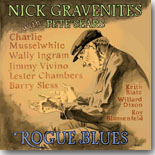 Nick
Gravenites was a key figure in the
Chicago blues/rock scene of the 1960s,
hanging around with the likes of Mike
Bloomfield, Elvin Bishop, Paul Butterfield,
and others. He played with Janis Joplin and
was also part of The Electric Flag. This
dude was a significant player back in the
day, and is still putting out music even
though he's into his 80s. Nick
Gravenites was a key figure in the
Chicago blues/rock scene of the 1960s,
hanging around with the likes of Mike
Bloomfield, Elvin Bishop, Paul Butterfield,
and others. He played with Janis Joplin and
was also part of The Electric Flag. This
dude was a significant player back in the
day, and is still putting out music even
though he's into his 80s.
Rogue Blues (M.C. Records), his album
with piano player Pete Sears, is Gravenites'
first recording in eight years, with these
sessions taking place just a few years ago.
He's no longer able to play the guitar due
to arthritis in his hands, but Jimmy
Vivino helps out on the session, as does
another 1960s associate, Charlie Musselwhite,
who contributes his usually fine harmonica
playing. While his voice shows some age (as
expected), Gravenites is still a perfectly
fine singer.
Three cuts stand out, starting with the
up-tempo blues "Poor Boy," opening with a
piano intro from Sears and then very good
harmonica accompaniment from Musselwhite.
Lester Chambers of the Chambers Brothers
handles the harmonica work on the slow blues
ballad "Left Hand Soul," with Gravenites
doing his best vocal work, singing, "...Livin'
in this right hand world with my left hand
soul ..." Gravenites also sounds invigorated
on the mid-tempo "Blues Singer," reciting a
litany of great bluesmen who he saw in
Chicago in his early days while Sears gently
backs him on piano.
Another interesting cut is "Blackberry Jam,"
done in an old, old blues style, made
special by the sousaphone accompaniment of
Keith Blatz. We hear Vivino on mandolin on
"Brown Paper Bag." Sears and Vivino join
Gravenites on vocals on "Blues Back Off Of
Me," with Musselwhite returning on
harmonica. Extra variety is heard on the
closer, "What Time Is It," which is more of
a country tune thanks to the pedal steel
accompaniment of Barry Sless.
It's good to hear from Nick Gravenites
again. He was so instrumental in many of the
early bands that we heard back in the day.
His contributions were such a distant memory
for me that I didn't remember that he wrote
the classic "Born In Chicago" that was done
often by The Paul Butterfield Blues Band.
What a legacy!
--- Bill
Mitchell
|